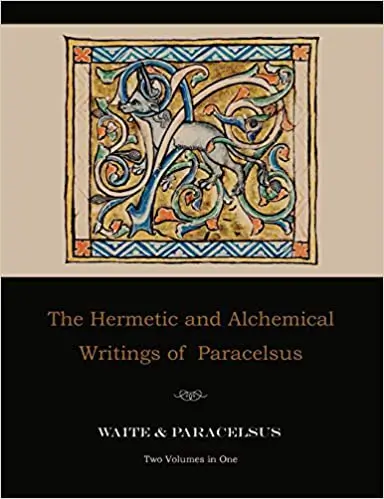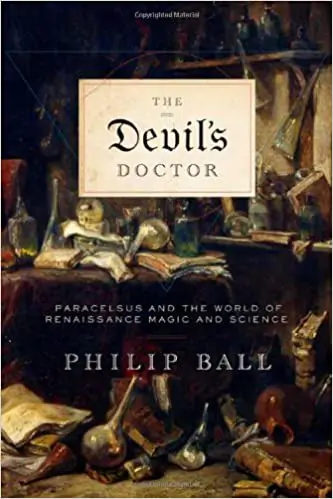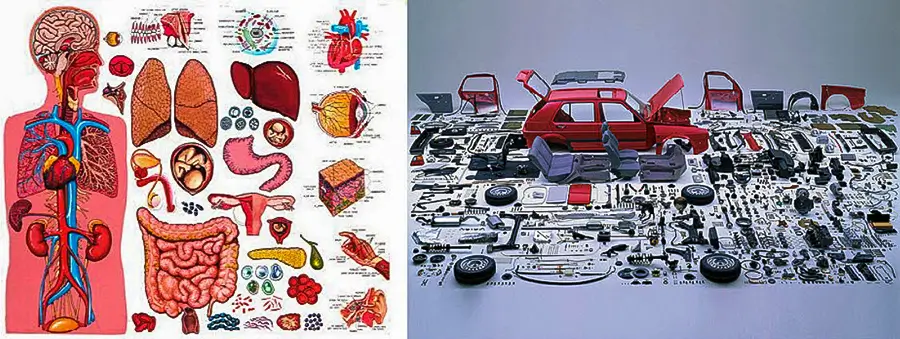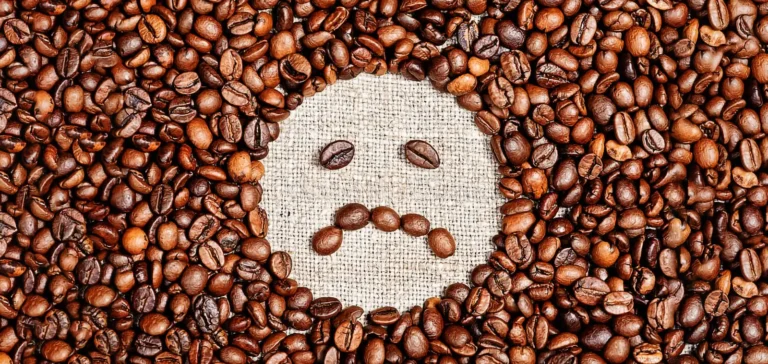Allopathische Medizin- Die Psychologie der Angst
Vor rund 100 Jahren gelang es der allopathischen Medizin endgültig, die ganzheitlichen Erfahrungsärzte zu neutralisieren. Allopathische Ärzte behandeln keine Krankheiten, sie behandeln Symptome.
Milos Pokimica
Geschrieben von: Milos Pokimica
Medizinisch Begutachtet Von: Dr. Xiùying Wáng, M.D.
Aktualisiert am 9. Juni 2023Menschen werden mit nur zwei instinktiven Ängsten geboren. Das eine ist die Angst vor dem Stürzen, das andere die Angst vor lauten Geräuschen. Alles andere, was wir fürchten, haben wir im Laufe unseres Lebens erworben und werden normalerweise durch bestimmte Umstände und Situationen hervorgerufen, die sich in unserem Geist und in unseren Gefühlen auf eine Weise registriert haben, die uns Angst macht. Dann reagiert unser Körper mit der Kampf- oder Fluchtreaktion.
Angst ist die stärkste Emotion überhaupt und bestimmt letztendlich unser Verhalten. Angst ist stärker als rationales Denken, weil sie eine konditionierte evolutionäre Reaktion ist, die uns am Leben erhält. Für alle Tiere und für unsere homininen Vorfahren waren einige echte Ängste die Angst, zur Mahlzeit zu werden, und die Angst vor dem Verhungern.
Die Menschen könnten den dritten hinzufügen, und das ist die Angst vor der Krankheit.
Heute müssen wir uns nicht mehr vor Raubtieren fürchten, und für die meisten Industrieländer besteht keine Angst mehr vor Hunger. Dennoch besteht weiterhin Angst vor der Krankheit. Und wo Angst ist, ist Manipulation.
Manche Menschen sind sehr gut darin, die Gefühle anderer für ihren eigenen Vorteil zu nutzen. Sie nennen das gerne Marketing oder Propaganda. Es handelt sich lediglich um emotionale Manipulation. In manchen Fällen kann die Zurückhaltung der Tatsachen den gleichen gewünschten Effekt haben.
Verstehen Sie mich nicht falsch, in der Medizin Gewinn zu machen, ist nichts Schlimmes. Das Problem entstand, als die Medizin Teil eines größeren hierarchischen Struktursystems wurde, das auf eine umfassende Kontrolle und Nutzung der Ressource Menschen ausgelegt ist.
In der modernen Medizin wird vor allem mit kranken Menschen Profit gemacht. Gesunde Menschen sind nicht sehr lukrativ. Sie können ihnen Nahrungsergänzungsmittel verkaufen, aber auf diesem Markt liegt nicht das wahre Geld. Niemand in Ihrer Nähe wird welche haben Interesse daran, Ihnen die ganze Wahrheit zu sagen und Sie außer Ihnen gesund zu halten. Es ist nur Ihre Aufgabe und niemand anderes. Es ist nicht die Aufgabe Ihres Arztes. Ihm ist Ihre Gesundheit egal. Er wird aufhören, Ihnen zuzuhören, Sekunden nachdem Sie angefangen haben zu sprechen. Er wird das Rezept ausstellen und für den Fall, dass etwas schief geht, auch darüber nachdenken, wie er sich vor einer Haftung schützen kann. Das ist seine eigentliche Aufgabe. Selbst wenn er Zeit mit Ihnen verbringen wollte, würde er es schwer haben, weil die Ärzte selbst nicht wissen, was die Wahrheit ist, abgesehen von dem, was sie im College lernen, und tatsächlich eine Lebenserwartung haben, die viel kürzer als der Durchschnitt ist. Selbst wenn es ein echtes Wundermittel gäbe, besteht das Interesse darin, es zum Schweigen zu bringen. Allein Krebsbehandlungsmedikamente brachten der Industrie im Jahr 2018 weltweit 117 Milliarden US-Dollar ein und es wird erwartet, dass sie bis 2021 die 150-Milliarden-Dollar-Marke überschreiten. Und das ohne eine endlose Kette medizinischer Tests, Operationen und unterstützender Therapien. Das ist eine Realität.
Wir sind evolutionär bedingt, um uns zu fürchten und zu hassen, damit wir uns verbessern, anpassen und überleben können. Hohes Glück und Liebe haben nichts mit dem Überleben in sich ständig verändernden Lebensräumen zu tun. Intelligentere Mitglieder unserer Gesellschaft werden die Ängste der Menschen für ihren Profit und ihre Kontrolle manipulieren, und das tun sie auch.. Gemessen an der Gesetzgebung, die die WHO vorantreibt, und den Industriestandards für Präventivmedizin, die ein weiterer Betrug sind, bestünde das Ziel der öffentlichen Gesundheitspolitik im 21. Jahrhundert darin, bei einem immer größeren Teil der Bevölkerung ständige Angst zu verbreiten. Das könnte logisch schwer zu verstehen sein, deshalb werde ich es so umformulieren.
Haben Sie Angst, wenn Sie nicht krankenversichert sind? Wie wäre es mit etwas Unbedeutendem wie einem Zahntarif? Haben Sie Angst, wenn Sie sich nicht jährlich kontrollieren lassen? Was ist mit Brustkrebs oder einer anderen Krebsvorsorgeuntersuchung? Glauben Sie, dass Sie Angst verspüren würden, wenn der Arzt Ihnen sagen würde, dass Sie Krebs haben? Glauben Sie, dass Sie bei einer genetischen Veranlagung in ständiger Angst davor leben könnten, daran zu erkranken? Haben Sie Angst, Ihrem Arzt nicht zu gehorchen? Was ist, wenn Sie Ihre Kinder nicht impfen? Es zwingend erforderlich ist. Du hast nicht einmal eine Wahl.
Was glauben Sie, warum die Industrie all die Dinge tut, die sie den "alternativen", "Pseudo-" und allen anderen "Namen"-Wissenschaftlern antut, die nicht der Firmenlinie der Medizin folgen? Glauben Sie, dass dies nur geschieht, um Sie vor schlechten Ärzten zu schützen, die Ihnen schaden werden, weil sie alle verrückt sind und Schlangenöl verkaufen? Wissen Sie, dass die Ärzte selbst Angst haben, ihren Job zu verlieren, wenn sie den Richtlinien der Industrie nicht folgen? Glauben Sie, dass "sie" sich um Sie sorgen? Letztendlich hat uns die Medizin mit Antibiotika und Impfstoffen von Infektionen befreit.
Vor rund 100 Jahren gelang es der modernen Medizin schließlich, sogenannte Erfahrungsärzte bzw. Ganzheits- bzw. Naturheiler zu neutralisieren. Im 19. Jahrhundert war die Gesellschaft in zwei Formen der Medizin gespalten und beide Formen wurden gleichermaßen durch Gesetze und Beschränkungen reguliert. Die Patienten hatten die Wahl zwischen beiden Behandlungsformen, der allopathischen und der empirischen. Das Gleichgewicht und die Koexistenz beider medizinischer Zweige blieben gleich, bis etwa um die Jahrhundertwende neue medizinische Behandlungen auftauchten, die potenziell sehr profitabel waren.
Die American Medical Association wurde von starken Finanz- und Kontrollkräften unterstützt und beeinflusst und verwandelte die Medizin in eine Industrie. Internationale Bankenkartelle investierten enorme Summen in die Gründung der neuen Branche, insbesondere in die Schulen, die selbstgefällig mit ihnen kooperierten. Für das von ihnen ausgegebene Geld hatten sie die Bitte, einige ihrer Leute in einen Vorstand zu berufen, um dafür zu sorgen, dass ihr Geld sinnvoll ausgegeben wird. Was passierte, war, dass alle großen Universitäten große Zuschüsse von diesen Leuten erhielten und auch einen oder mehrere dieser Leute in den Vorstand aufnahmen. Nun, diese Menschen waren nicht da, um Wissenschaft und Wissen im Streben nach sozialem Wohlergehen und menschlichem Glück zu verbreiten. Sie wurden dort als größeres Planschema aufgestellt, um die Interessen der Bankiers zu wahren. Fast über Nacht wurden Schulen buchstäblich übernommen. Die Schulen erhielten große Geldsummen und gaben diese für neue teure Ausrüstung aus, bauten neue Gebäude und neue Labore und stellten mehr Forscher und Lehrer ein. Gleichzeitig verkauften sie jedoch ihre Anteile an die wachsende Industrie namens Medizin, die von neu gegründeten Pharmaunternehmen dominiert wird. Ab diesem Zeitpunkt in der Geschichte wurden Ärzten Arzneimittel und allopathische Formen der interventionellen Medizin zum Nutzen der privaten finanziellen Interessen des internationalen Bankenkartells beigebracht. Sie verkauften ihre Anteile an die wachsende Industrie namens Medizin, die von neu gegründeten Pharmaunternehmen dominiert wird. Ab diesem Zeitpunkt in der Geschichte wurden Ärzten Arzneimittel und allopathische Formen der interventionellen Medizin zum Nutzen der privaten finanziellen Interessen des internationalen Bankenkartells beigebracht. Sie verkauften ihre Anteile an die wachsende Industrie namens Medizin, die von neu gegründeten Pharmaunternehmen dominiert wird. Ab diesem Zeitpunkt in der Geschichte wurden Ärzten Arzneimittel und allopathische Formen der interventionellen Medizin zum Nutzen der privaten finanziellen Interessen des internationalen Bankenkartells beigebracht.

Auf dem Bild sind Treuhänder des General Educational Board, der ersten Rockefeller-Stiftung, bei einer Klausurtagung in Rockland, Maine, im Juli 1915 zu sehen. Neben Rockefeller (in der Mitte) sind beispielsweise auch Charles W. Eliot (ehemaliger Präsident der Harvard University), Harry Pratt Judson (Präsident der University of Chicago) und viele andere "wichtige" Personen zu sehen, die allein durch ihr Zusammentreffen einen so genannten Interessenkonflikt verursacht haben.
Paracelsus (der Name, den er sich selbst gab, geboren als Philippus Aureolus Theophrastus Bombastus von Hohenheimborn) wird manchmal als der "Vater" der Toxikologie, der Pharmazie und der modernen allopathischen Form der Medizin bezeichnet. Paracelsus war Alchimist, Okkultist und Chemiker und glaubte im Wesentlichen daran, Menschen zu vergiften, um Krankheiten zu heilen. Etwas, das der modernen Medizin entspricht. Wenn eine Chemikalie zum Beispiel keine Nebenwirkungen hat, oder mit anderen Worten, wenn die Chemikalie kein Gift ist, kann sie heute nicht einmal als Arzneimittel zugelassen werden. Nur Gifte, die Nebenwirkungen haben, können mit Erlaubnis des Arztes verabreicht werden, und das ist genau das, was die Industrie will. Ganzheitliches Heilen ist nicht profitabel. Paracelsus war eine Person, die in der Geschichte als wahrer Vater der modernen Medizin gilt. Er begann zum Beispiel die Behandlung von Geschlechtskrankheiten mit Quecksilber. Seine meist zitierte These war:
"Die Dosis macht das Gift". (Eine beliebte Kurzfassung.)
Das Originalzitat lautet:
„Alle Dinge sind Gift und nichts ist ohne Gift; Nur die Dosis macht aus, dass ein Ding kein Gift ist.“
Einige Lektüre über Paracelsus



Neben dieser profitorientierten, egozentrischen und interessengeleiteten Industrie gibt es noch einen anderen Teil der Probleme, mit denen wir in der Medizin konfrontiert sind, der philosophischer Natur ist. Die moderne Art, die Realität zu verstehen, basiert auf dem Glaubenssystem, dass die menschliche Vernunft der Natur überlegen ist. Der andere vorherrschende Glaube ist, dass es kein Leben gibt. Ja, das hast du richtig gelesen. Die wissenschaftliche Medizin glaubt nicht, dass es so etwas wie Leben gibt. Leben ist kein Leben. Es gibt keinen Unterschied zwischen lebender und toter Materie. Leben ist einfach komplizierter als tote Materie, die so angeordnet ist, dass sie die komplizierteste und strukturierteste Maschine im Universum bildet, die wir als Leben wahrnehmen. Es handelt sich lediglich um die Neuanordnung toter Atome. Dieses Glaubenssystem ist die Essenz der Evolutionstheorie, der Medizin und der gesamten Wissenschaft, die wir heute haben. Es ist ein Grundprinzip, das unsere gesamte Zivilisation definiert, nicht nur die medizinische Praxis.
Es ist schwer zu erklären, deshalb werde ich ein Beispiel verwenden. Wir können einen menschlichen Organismus nehmen und ihn in funktionierende "Teile" zerlegen. Wir erhalten das Gehirn, das Herz, die Lunge und so weiter. Alle diese Organe sind getrennt und tun etwas für den Organismus. Gleichzeitig können wir auch ein durchschnittliches Auto in funktionierende Teile zerlegen. Wir erhalten einen Antriebsmotor, Räder, Motorhauben und so weiter. Alle diese Teile sind getrennt und tun etwas für das Auto als Ganzes. So haben sowohl das Auto als auch der Mensch viele ähnliche Eigenschaften. Sie haben viele funktionale Teile. Beide können sich bewegen, und beide brauchen eine konstante Energiezufuhr, um zu funktionieren. Wenn sie arbeiten, erhitzen sie sich beide, und wenn sie sich zu sehr erhitzen, müssen sie anhalten und sich abkühlen. Wenn sie ohne Energie bleiben, bleiben beide stehen und rosten schließlich (werden alt) und sterben.
Sterben ist kein echter medizinischer Begriff. Da es kein Leben gibt und beide nur neu geordnete Todesmaterie sind, können sie nicht sterben, sie können einfach aufhören zu funktionieren. Da unser Körper wie jedes andere Auto nur dumme Maschinen ist, behandeln wir Krankheiten auf die gleiche Weise wie kaputte Autos. Wir bieten Interventionsbehandlungen an.
Dies ist das Glaubenssystem, das man in Krankenhäusern antrifft. Das ist eigentlich großartig, wenn Sie gerade einen Unfall hatten und Sie Ihr Leben retten müssen, aber für alles andere ist es schrecklich. Diese Philosophie hat eine schädliche Wirkung.
Ärzte behandeln eigentlich überhaupt keine Krankheiten. Sie behandeln Symptome. Sie haben zum Beispiel eine Erkältung und Ihr Körper hat die Temperatur erhöht, um dagegen anzukämpfen. Was wird Ihnen Ihr Arzt verschreiben? Sie werden Ihnen etwas geben, um die Temperatur zu senken und Sie von Schmerzen zu befreien. Dadurch wird es für Ihr Immunsystem nur schwieriger, dagegen anzukämpfen, aber jetzt haben Sie keine Symptome mehr. Bist du also gesund? Wenn Sie keine Symptome haben, haben Sie die Krankheit nicht. Sie haben immer noch das Virus, aber Sie fühlen sich gut, also geht es Ihnen gut. So funktioniert die moderne Medizin. Sie sind vielleicht voller Giftstoffe, haben eine hohe Entzündungsrate und wer weiß, was noch alles, aber bis Sie ein echtes Problem wie Krebs oder eine Herzerkrankung haben, raten Sie mal. Sie sind gesund.
Solange sie keine Symptome erkennen, können sie nichts für Sie tun. Es geht ihnen nicht um die Förderung von Gesundheit und Leben. Sie sind keine im Gesundheitswesen tätigen Personen.
Allopatrische Medizin beschäftigt sich mit Krankheit. Die allopatrische Medizin befasst sich mit Symptomen. Wer kümmert sich um echte Krankheiten? Dein Körper tut es.
Es gibt keine Heilmittel. Sie können Ihrem Körper nur dabei helfen, zu heilen und ihn davor zu bewahren, überhaupt erst krank zu werden. Die Heilmittel, die Sie von Ärzten erhalten, sind keine Heilmittel. Es sind Behandlungen.
Wenn wir diese beiden Überzeugungen kombinieren, dass es kein Leben gibt und dass die menschliche Vernunft die höchste Macht über die Natur hat, haben wir etwas namens allopathische (moderne) Medizin.
Es gibt jedoch einen wesentlichen Unterschied zwischen Maschinen wie Autos und Maschinen wie einem menschlichen Organismus. Das Merkmal eines lebenden Organismus ist die Selbstversorgung. Im Gegensatz zu Maschinen können lebende Organismen sich selbst heilen und erhalten. Sie brauchen keinen Mechaniker. Wenn das Auto sich selbst reparieren und selbst zur Tankstelle fahren kann, dann wäre das Auto ein Lebewesen. Das ist etwas, was die moderne allopathische Medizin nicht erkennt. Sie behandeln jeden Schmerz, jedes Symptom und jede Krankheit, aber sie behandeln nicht die Ursachen der Krankheiten und behandeln nicht den gesamten Körper ganzheitlich. Die Medizin ist in Fachgebiete unterteilt, wobei jeder Arzt ein Spezialist auf seinem Gebiet ist und sein eigenes Organ untersucht, wo jedes Problem seinen lateinischen Namen und eine Liste der zu verschreibenden Medikamente erhält. Und das ist alles. Die Schüler lernen diese „Listen“, als würden sie Liedtexte auswendig lernen und jeder singt sein eigenes Lied mit einer anderen Vorgabe. So weit werden Sie bei einer Behandlung in keinem Krankenhaus gehen. Die gesamte Gesundheitsfantasie ist nur Propaganda für Sie, damit Sie sich sicher fühlen und weiterhin einen großen Teil Ihres Einkommens in die Industrie stecken können. Sie wissen, dass Ihnen Ihre Gesundheit egal ist, solange Sie gesund sind, und warten darauf, dass bei Ihnen einige der Symptome auftreten, die Ihre Angst auslösen. Wenn die ersten Krankheitssymptome auftreten, ist es zu spät. Merken Sie sich diesen nächsten Satz.
Es gibt kein magisches Heilmittel. Es gibt kein Heilmittel. Ihr eigener Körper ist das Heilmittel. Wenn Sie es missbrauchen, erwarten Sie keine lila Zauberpillen. Nur lila magische Schmerzmittel.
Verweise:
Ausgewählte Passagen aus einem Buch: Pokimica, Milos. Zum Veganer werden? Rückblick auf die Wissenschaft Teil 2. Kindle-Ausgabe, Amazon, 2018.
Zusammenhängende Posts
Haben Sie Fragen zum Thema Ernährung und Gesundheit?
Ich würde gerne von Ihnen hören und sie in meinem nächsten Beitrag beantworten. Ich freue mich über Ihren Beitrag und Ihre Meinung und freue mich darauf, bald von Ihnen zu hören. Ich lade Sie auch dazu ein Folgen Sie uns auf Facebook, Instagram und Pinterest für weitere Inhalte zu Ernährung und Gesundheit. Sie können dort einen Kommentar hinterlassen und sich mit anderen Gesundheitsbegeisterten austauschen, Ihre Tipps und Erfahrungen teilen und Unterstützung und Ermutigung von unserem Team und unserer Community erhalten.
Ich hoffe, dass dieser Beitrag für Sie informativ und unterhaltsam war und dass Sie bereit sind, die gewonnenen Erkenntnisse anzuwenden. Wenn Sie diesen Beitrag hilfreich fanden, dann es teilen mit Ihren Freunden und Familienangehörigen, die ebenfalls davon profitieren könnten. Man weiß nie, wer auf seinem Weg zur Gesundheit vielleicht etwas Anleitung und Unterstützung braucht.
– Das könnte Ihnen auch gefallen –

Über Ernährung Lernen
Milos Pokimica ist Doktor der Naturheilkunde, klinischer Ernährungsberater, Autor für medizinische Gesundheit und Ernährung sowie Berater für Ernährungswissenschaften. Autor der Buchreihe Zum Veganer werden? Rückblick auf die Wissenschafter betreibt auch das Natürliche Gesundheit website GoVeganWay.com
Medizinischer Haftungsausschluss
GoVeganWay.com bietet Ihnen Rezensionen der neuesten Ernährungs- und Gesundheitsforschung. Die bereitgestellten Informationen stellen die persönliche Meinung des Autors dar und sind weder als Ersatz für professionelle medizinische Beratung, Diagnose oder Behandlung gedacht noch impliziert. Die bereitgestellten Informationen dienen ausschließlich Informationszwecken und sollen nicht als Ersatz für die Beratung, Diagnose und/oder medizinische Behandlung durch einen qualifizierten Arzt oder Gesundheitsdienstleister dienen.Ignorieren Sie niemals professionellen medizinischen Rat oder verzögern Sie die Suche nach medizinischer Behandlung, weil Sie etwas auf GoVeganWay.com gelesen oder über GoVeganWay.com darauf zugegriffen haben
Nehmen Sie NIEMALS Änderungen im Lebensstil oder irgendwelche Änderungen vor, die eine Folge von etwas sind, das Sie auf GoVeganWay.com gelesen haben, bevor Sie einen zugelassenen Arzt konsultieren.
Bei einem medizinischen Notfall rufen Sie sofort einen Arzt oder die Notrufnummer 911 an. GoVeganWay.com empfiehlt oder unterstützt keine bestimmten Gruppen, Organisationen, Tests, Ärzte, Produkte, Verfahren, Meinungen oder andere Informationen, die darin erwähnt werden könnten.
Herausgeber-Tipps –
Milos Pokimica ist Autor für Gesundheit und Ernährung sowie Berater für Ernährungswissenschaften. Er ist Autor einer Buchreihe. Zum Veganer werden? Rückblick auf die Wissenschafter betreibt auch das Natürliche Gesundheit website GoVeganWay.com
Neueste Artikel –
Top-Gesundheitsnachrichten – ScienceDaily
- The overlooked nutrition risk of Ozempic and Wegovyam Februar 4, 2026
Popular weight-loss drugs like Ozempic and Wegovy can dramatically curb appetite, but experts warn many users are flying blind when it comes to nutrition. New research suggests people taking these medications may not be getting enough guidance on protein, vitamins, and overall diet quality, increasing the risk of muscle loss and nutrient deficiencies.
- A 25-year study found an unexpected link between cheese and dementiaam Februar 4, 2026
A massive Swedish study tracking nearly 28,000 people for 25 years found an unexpected link between full-fat dairy and brain health. Among adults without a genetic risk for Alzheimer’s, eating more full-fat cheese was associated with a noticeably lower risk of developing the disease, while higher cream intake was tied to reduced dementia risk overall. The findings challenge decades of low-fat dietary advice but come with important caveats.
- MIT’s new brain tool could finally explain consciousnessam Februar 4, 2026
Scientists still don’t know how the brain turns physical activity into thoughts, feelings, and awareness—but a powerful new tool may help crack the mystery. Researchers at MIT are exploring transcranial focused ultrasound, a noninvasive technology that can precisely stimulate deep regions of the brain that were previously off-limits. In a new “roadmap” paper, they explain how this method could finally let scientists test cause-and-effect in consciousness research, not just observe […]
- Why heart disease risk in type 2 diabetes looks different for men and womenam Februar 4, 2026
Scientists are digging into why heart disease risk in type 2 diabetes differs between men and women—and sex hormones may be part of the story. In a large Johns Hopkins study, men with higher testosterone had lower heart disease risk, while rising estradiol levels were linked to higher risk. These hormone effects were not seen in women. The results point toward more personalized approaches to heart disease prevention in diabetes.
- Sound machines might be making your sleep worseam Februar 4, 2026
Sound machines may not be the sleep saviors many believe. Researchers found that pink noise significantly reduced REM sleep, while simple earplugs did a better job protecting deep, restorative sleep from traffic noise. When pink noise was combined with outside noise, sleep quality dropped even further. The results suggest that popular “sleep sounds” could be doing more harm than good—particularly for kids.
- This unexpected plant discovery could change how drugs are madeam Februar 3, 2026
Plants make chemical weapons to protect themselves, and many of these compounds have become vital to human medicine. Researchers found that one powerful plant chemical is produced using a gene that looks surprisingly bacterial. This suggests plants reuse microbial tools to invent new chemistry. The insight could help scientists discover new drugs and produce them more sustainably.
- A hidden cellular process may drive aging and diseaseam Februar 3, 2026
As we age, our cells don’t just wear down—they reorganize. Researchers found that cells actively remodel a key structure called the endoplasmic reticulum, reducing protein-producing regions while preserving fat-related ones. This process, driven by ER-phagy, is tied to lifespan and healthy aging. Because these changes happen early, they could help trigger later disease—or offer a chance to stop it.
PubMed, #Vegane Diät –
- Diet type and the oral microbiomeam Februar 2, 2026
CONCLUSION: The diet-oral microbiome-systemic inflammation axis is bidirectional and clinically relevant. Understanding both direct ecological regulation and indirect metabolic effects is essential to support precision nutrition strategies aimed at maintaining oral microbial balance and systemic inflammatory risk mitigation.
- Consensus document on healthy lifestylesam Januar 22, 2026
Proteins are a group of macronutrients that are vital to our lives, as they perform various functions, including structural, defensive and catalytic. An intake of 1.0-1.2 g/kg/body weight per day would be sufficient to meet our needs. Carbohydrate requirements constitute 50 % of the total caloric value and should be obtained mainly in the form of complex carbohydrates. In addition, a daily intake of both soluble and insoluble fiber is necessary. Regular consumption of extra virgin olive oil […]
- Vitamin B12 and D status in long-term vegetarians: Impact of diet duration and subtypes in Beijing, Chinaam Januar 21, 2026
CONCLUSIONS: This study reveals a dual challenge among Beijing long-term vegetarians: vitamin B12 deficiency was strongly associated with the degree of exclusion of animal products from the diet (veganism), while vitamin D deficiency was highly prevalent and worsened with longer diet duration. The near-universal vitamin D deficiency observed in this study suggests that, in the Beijing context, the risk may extend beyond dietary choice, potentially reflecting regional environmental factors;…
- Nutritional evaluation of duty meals provided to riot police forces in Germanyam Januar 13, 2026
Background: The primary role of the German riot police is maintaining internal security. Due to challenging working conditions, riot police forces face an elevated risk of various diseases. During duty, forces are provided with meals. A balanced diet can reduce the risk of some of these diseases and contribute to health-promoting working conditions. Aim: First evaluation of the nutritional quality of duty meals in Germany based on German Nutrition Society recommendations (DGE). Methods: In…
- Iodineam Januar 1, 2006
Iodine is an essential trace nutrient for all infants that is a normal component of breastmilk. Infant requirements are estimated to be 15 mcg/kg daily in full-term infants and 30 mcg/kg daily in preterm infants.[1] Breastmilk iodine concentration correlates well with maternal urinary iodine concentration and may be a useful index of iodine sufficiency in infants under 2 years of age, but there is no clear agreement on a value that indicates iodine sufficiency, and may not correlate with […]
Zufällige Beiträge –
Beliebte Beiträge -
Neuestes von PubMed, #pflanzliche Ernährung –
- From paddy soil to dining table: biological biofortification of rice with zincvon Lei Huang am Februar 4, 2026
One-third of paddy soils are globally deficient in zinc (Zn) and 40% of Zn loss in the procession from brown rice to polished rice, which results in the global issue of hidden hunger, e.g., the micronutrient deficiencies in the rice-based population of developing countries. In the recent decades, biofortification of cereal food crops with Zn has emerged as a promising solution. Herein, we comprehensively reviewed the entire process of Zn in paddy soil to human diet, including the regulatory…
- Molecular Characterization of Tobacco Necrosis Virus A Variants Identified in Sugarbeet Rootsvon Alyssa Flobinus am Februar 3, 2026
Sugarbeet provides an important source of sucrose; a stable, environmentally safe, and low-cost staple in the human diet. Viral diseases arising in sugarbeet ultimately impact sugar content, which translates to financial losses for growers. To manage diseases and prevent such losses from occurring, it is essential to characterize viruses responsible for disease. Recently, our laboratory identified a tobacco necrosis virus A variant named Beta vulgaris alphanecrovirus 1 (BvANV-1) in sugarbeet…
- Nutrition in early life interacts with genetic risk to influence preadult behaviour in the Raine Studyvon Lars Meinertz Byg am Februar 3, 2026
CONCLUSIONS: Nutrition in early life and psychiatric genetic risk may interact to determine lasting child behaviour. Contrary to our hypothesis, we find dietary benefits in individuals with lower ADHD PGS, necessitating replication. We also highlight the possibility of including genetics in early nutrition intervention trials for causal inference.
- Effect of the gut microbiota on insect reproduction: mechanisms and biotechnological prospectsvon Dilawar Abbas am Februar 2, 2026
The insect gut microbiota functions as a multifunctional symbiotic system that plays a central role in host reproduction. Through the production of bioactive metabolites, gut microbes interact with host hormonal pathways, immune signaling, and molecular regulatory networks, thereby shaping reproductive physiology and fitness. This review summarizes recent advances in understanding how gut microbiota regulate insect reproduction. Accumulating evidence demonstrates that microbial metabolites…
- Rationale and design of a parallel randomised trial of a plant-based intensive lifestyle intervention for diabetes remission: The REmission of diabetes using a PlAnt-based weight loss InteRvention…von Brighid McKay am Februar 2, 2026
CONCLUSIONS: This trial will provide high-quality clinical evidence on the use of plant-based ILIs to address the epidemics of obesity and diabetes to inform public health policies and programs in Canada and beyond.
- Diet type and the oral microbiomevon Daniel Betancur am Februar 2, 2026
CONCLUSION: The diet-oral microbiome-systemic inflammation axis is bidirectional and clinically relevant. Understanding both direct ecological regulation and indirect metabolic effects is essential to support precision nutrition strategies aimed at maintaining oral microbial balance and systemic inflammatory risk mitigation.



















